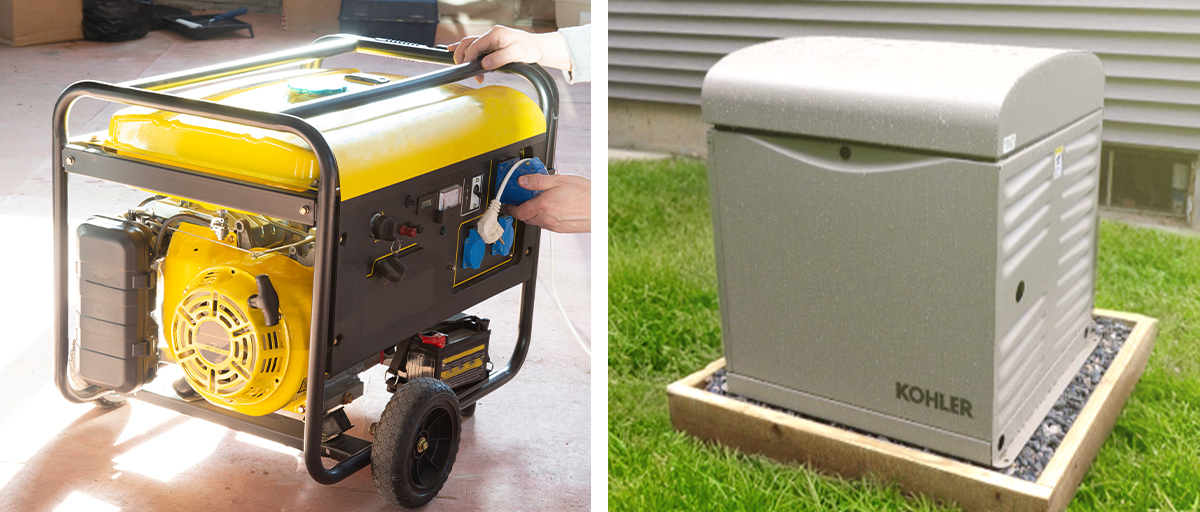Which Type of Generator Is Right for You?

Standby Generators vs. Portable Generators
When it comes to deciding on a backup power source for your home or business, there are 2 popular options to choose from – the standby generator and the portable generator. Both options can provide electricity during a power outage, and each has its own features and advantages. Knowing the pros and cons of each will help you decide which is the best option for your home or business.
Pros of a Standby Generator
Seamless Automation
Standby generators are permanent fixtures that connect directly to your home or business’ electrical system. When a power outage occurs, the transfer switch will activate automatically, ensuring uninterrupted power without any manual intervention. This automated functionality is a significant advantage, especially for homeowners and businesses seeking consistent power restoration.
High Power Capacity
Standby generators are designed to handle the electricity demand of an entire property. Their high power capacity, typically ranging from 10 kW to several hundred kW, allows them to power essential appliances like HVAC systems, well and sump pumps, refrigerators, lighting, and electronics simultaneously.
Continuous Fuel Source
Standby generators are usually connected to a natural gas line, propane tank, or diesel supply. This constant large-capacity fuel source ensures prolonged run times, making them suitable for extended outages and continuous power backup.
Cons of a Standby Generator
Higher Upfront Cost
The installation and equipment costs for standby generators are higher compared to portable generators. This initial investment may be a consideration for those on a limited budget. However, a standby generator will also bring added resale value to your home.
Professional Installation Required
Standby generators require installation from a qualified professional due to their integration into the electrical system, fuel systems, and site work. This can add to the upfront costs but ensures safe and efficient operation.
Pros of a Portable Generator
Mobility and Flexibility
As the name suggests, portable generators are designed for easy transportation. They are compact and lightweight, making them ideal for camping trips, outdoor events, and other mobile power needs. Their versatility allows you to use them where power is required on-the-go.
Affordable Option
Portable generators are generally more budget-friendly upfront, making them an attractive choice for occasional use or specific events. They are a practical solution for those looking for a backup power supply without a significant initial investment.
User-Friendly Operation
Starting a portable generator is simple – just fill it up with gasoline, pull the starter cord, and you have power. There’s no need for complex installation or wiring.
Cons of Portable Generators
Limited Power Output
Portable generators come with varied power output, ranging from a few hundred watts to several thousand watts. Generally they are incapable of powering an entire home, meaning you need to carefully manage power usage and prioritize which appliances to run during an outage.
Manual Start Required
Unlike standby generators, portable generators require manual startup. This means you need to be present to activate them when the power goes out. This can be especially inconvenient during a storm.
Fuel Storage and Run Time
Portable generators typically run on gasoline, which has a limited shelf life and can be cumbersome to store in large volumes. Obtaining an adequate supply of fuel may be a concern during extended outages.
Noisy Machinery
Because they are smaller and have less insulation than standby generators, portable generators run at a higher decibel level (dB) than standby generators, making them more noisy. Unfortunately, the noise from portable generators can be disruptive and even harmful to hearing.
Hands-on Operation
Operating a portable power generator can be a hassle. First, you have to pull it out of storage, check the fuel and oil, and hope that the gasoline hasn’t gone bad since the last time you used it. Then, you have to run the power cable to the outlet and connect it. Next, you have to go to the electrical panel and manually switch over to the generator. Finally, every eight hours or so, you have to shut down the generator and refuel it. This process can be time-consuming and inconvenient, especially if you have to do it in the middle of a power outage or during inclement weather.
Choosing a Generator
Deciding between a standby generator and a portable generator boils down to your specific requirements and priorities. If you value mobility, versatility, and a more affordable option, a portable generator can be a practical solution for intermittent power needs. Be sure to keep in mind its limited power output and manual start requirement. On the other hand, if you’re looking for automated, seamless power backup with high capacity and a continuous fuel supply, a standby generator is the ideal choice despite its higher upfront cost. The additional investment in a standby generator can pay for itself, especially if the power goes out and you’re not home. If you’re away at work or on vacation, a standby generator automatically kicks in backup power, protecting what’s inside the house without you having to lift a finger!
Consult With Tower Generator for Power You Can Trust
Specializing in standby power solutions, Tower Generator has been selling, installing, and servicing a wide variety of commercial and residential generators since 1997. We work with the top brands, including Kohler, Cummins, Generac, and Fortress, and are happy to offer recommendations on the right generators for our customers’ specific needs. If you’re interested in learning more about a backup power system for your home or business, contact our team for a free on-site survey.


